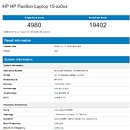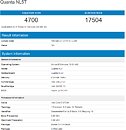Raevenlord
News Editor
- Joined
- Aug 12, 2016
- Messages
- 3,755 (1.21/day)
- Location
- Portugal
| System Name | The Ryzening |
|---|---|
| Processor | AMD Ryzen 9 5900X |
| Motherboard | MSI X570 MAG TOMAHAWK |
| Cooling | Lian Li Galahad 360mm AIO |
| Memory | 32 GB G.Skill Trident Z F4-3733 (4x 8 GB) |
| Video Card(s) | Gigabyte RTX 3070 Ti |
| Storage | Boot: Transcend MTE220S 2TB, Kintson A2000 1TB, Seagate Firewolf Pro 14 TB |
| Display(s) | Acer Nitro VG270UP (1440p 144 Hz IPS) |
| Case | Lian Li O11DX Dynamic White |
| Audio Device(s) | iFi Audio Zen DAC |
| Power Supply | Seasonic Focus+ 750 W |
| Mouse | Cooler Master Masterkeys Lite L |
| Keyboard | Cooler Master Masterkeys Lite L |
| Software | Windows 10 x64 |
Intel is gearing up towards launching their mobile CPU solutions based on the current desktop architecture, Coffee Lake. These mobile CPUs will bring Intel's increased core and thread counts philosophy to the mobile crowds, thus increasing overall performance due to the extra two cores and four threads on the top of the line processors.
The CPU that was benchmarked on Geekbench is the i7-8750H, a six-core, twelve-thread CPU with a 2.2 GHz base clock and up to 4.1 GHz Turbo speeds. Its L3 cache department makes do with a pretty respectable 9 MB, and all of this is wrapped in a 45 W TDP package. As it comes to scores, these show expected gains over Intel's previous generation Kaby Lake Core i7-7700HQ - around 20% in single-thread workloads, and a more impressive 50% boost in multi-threaded ones. Two Quanta systems based on the i7-8750H managed single-thread scores of 4700 and 5008, and multi-threaded marks of 17,504 and 20,715. A HP system using the same chip scored 4980 in the single-thread test and 19,402 in the multi-thread benchmark. All in all, impressive gains in the processing prowess department, though these are overwhelmingly derived from the extra cores and threads, and not from some spectacular microarchitecture improvements.



View at TechPowerUp Main Site
The CPU that was benchmarked on Geekbench is the i7-8750H, a six-core, twelve-thread CPU with a 2.2 GHz base clock and up to 4.1 GHz Turbo speeds. Its L3 cache department makes do with a pretty respectable 9 MB, and all of this is wrapped in a 45 W TDP package. As it comes to scores, these show expected gains over Intel's previous generation Kaby Lake Core i7-7700HQ - around 20% in single-thread workloads, and a more impressive 50% boost in multi-threaded ones. Two Quanta systems based on the i7-8750H managed single-thread scores of 4700 and 5008, and multi-threaded marks of 17,504 and 20,715. A HP system using the same chip scored 4980 in the single-thread test and 19,402 in the multi-thread benchmark. All in all, impressive gains in the processing prowess department, though these are overwhelmingly derived from the extra cores and threads, and not from some spectacular microarchitecture improvements.



View at TechPowerUp Main Site




